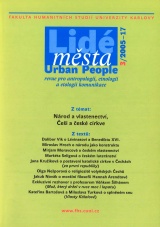Conscience and Judgment Confronting the Originality of Totalitarianism
On Selected Issues of Hannah Arendt’s Moral Philosophy
DOI:
https://doi.org/10.14712/12128112.3875Abstract
The article, drawing from some recently published Arendt’s texts, namely from Personal Responsibility Under Dictatorship and Some Questions of Moral Philosophy, attempts to give an account of Hannah Arendt’s moral philosophy. By this „moral philosophy“ is understood the connection of some key motives, namely the issue of functioning of certain fundamental human capacities – critical thinking, conscience and judgment - in the situation, when the individual is confronted with totalitarian rule. This means for Arendt, that the horrible originality of totalitarianism does not only transcend all traditional categories, general rules and measurements for acting, judging and understanding, it also explodes them: for Arendt, the event of the rise of totalitarianism means the breakdown of all our tradition. In this article, I proceed from showing the point of departure of Arendt’s reflections, which is her famous analysis of Adolf Eichmann trial. Confronted with Eichmann’s total „thoughtlessness“ Arendt poses the question: can the absence of (critical) thinking prevent individual from doing evil? And is this absence in some way connected with the total failure of what we commonly call conscience and with inability to judge, i.e. to tell the right from wrong? The next two sections of presented article thus concentrate on Arendt’s conception of conscience and judgment. I am trying to interpret Arendt’s notion of human faculty of conscience as a sort of „passing“ between acting and thinking, which Arendt treats as two distinct activities, as two distinct modes of human existence, in which we cannot „dwell“ simultaneously: according to Arendt, conscience can be understood as something, which somehow unites acting and thinking. Ultimately, conscience can provide us with some criterion of action, which can guide our deeds exactly in those situations, when all others firm criteria were destroyed. Arendt’s account of „moral judgment“ (as a distinctive mode of the human faculty of judgment) is in some way similar: how can we judge with no general rules under which to subsume particular cases? The article concludes with thesis, that according to Arendt’s reflections on moral issues, it is the relation between acting and thinking, where human individuality, man as a person is constituted. When men resign to perform their own, individual judgments and when they refuse to lay confines to their actions (when this „laying of confines“ is taking place at the field of conscience), they cease to be distinctive persons and become „nobodies“.
Downloads
Published
How to Cite
Issue
Section
License

This work is licensed under a Creative Commons Attribution-NonCommercial-NoDerivatives 4.0 International License.


